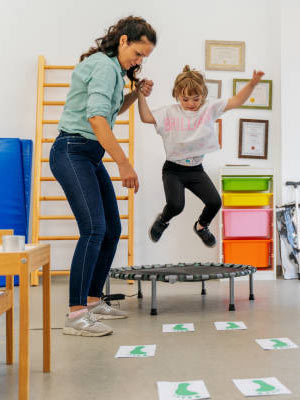- +91 7680015156
- advaithacdc@gmail.com
Occupational therapy
- Home
- Services
- Occupational therapy
Occupational therapy plays a crucial role in enhancing the lives of children by addressing various developmental challenges. In this comprehensive guide, we delve into the realm of pediatric occupational therapy, exploring its definition, key principles, and how it significantly contributes to the holistic development of children.
What is Occupational Therapy?
Occupational therapy, commonly abbreviated as OT, is a specialized healthcare profession aimed at helping individuals develop or regain the skills needed for daily activities. In the context of child development, occupational therapists work with children to overcome challenges related to fine and gross motor skills, sensory processing, socialization, self-care, and overall independence.
Key Principles of Pediatric Occupational Therapy
Holistic Approach
Occupational therapy for children focuses on the whole child, considering their physical, emotional, and social well-being. Therapists collaborate with parents, educators, and other professionals to create a comprehensive support system.

Individualized Interventions
Each child is unique, and occupational therapists tailor interventions to meet specific needs. This may involve creating personalized activities and exercises to enhance the child's strengths and address areas requiring improvement.
Sensory Integration
Occupational therapists often employ sensory integration techniques to help children process and respond to sensory stimuli appropriately. This can be especially beneficial for children with sensory processing disorders.
Play-Based Therapy
Recognizing the importance of play in a child's development, occupational therapists use play as a therapeutic tool. Play-based interventions foster motor skills, cognitive development, and social interactions in a natural and enjoyable setting.
Collaboration with Caregivers
Successful outcomes in pediatric occupational therapy are often achieved through collaboration between therapists and caregivers. Therapists provide guidance and strategies that parents can incorporate into the child's daily routine.
Benefits of Occupational Therapy for Children
Improved Motor Skills
Occupational therapy enhances fine and gross motor skills, facilitating a child's ability to perform tasks such as writing, dressing, and feeding independently.
Enhanced Social Skills
Through targeted interventions, occupational therapy helps children develop crucial social skills, including communication, cooperation, and conflict resolution.
Increased Self-Esteem
Achieving success in occupational therapy activities boosts a child's confidence and self-esteem, positively impacting their overall emotional well-being.
Academic Success
Many children facing developmental challenges may experience difficulties in the classroom. Occupational therapy interventions can address these challenges, promoting academic success.
Independence in Daily Activities
Occupational therapy empowers children to engage in daily activities with greater independence, fostering a sense of accomplishment and self-reliance.
occupational therapy is a invaluable resource for supporting the healthy development of children. By focusing on individualized interventions, sensory integration, and collaboration with caregivers, occupational therapists play a crucial role in unlocking the full potential of every child, ensuring they can navigate life's challenges with confidence and independence.

